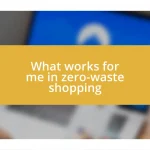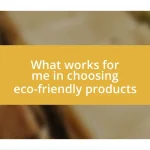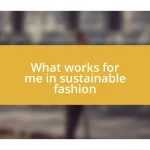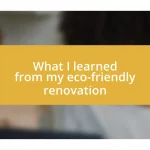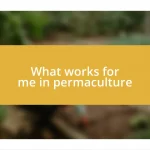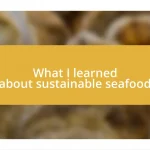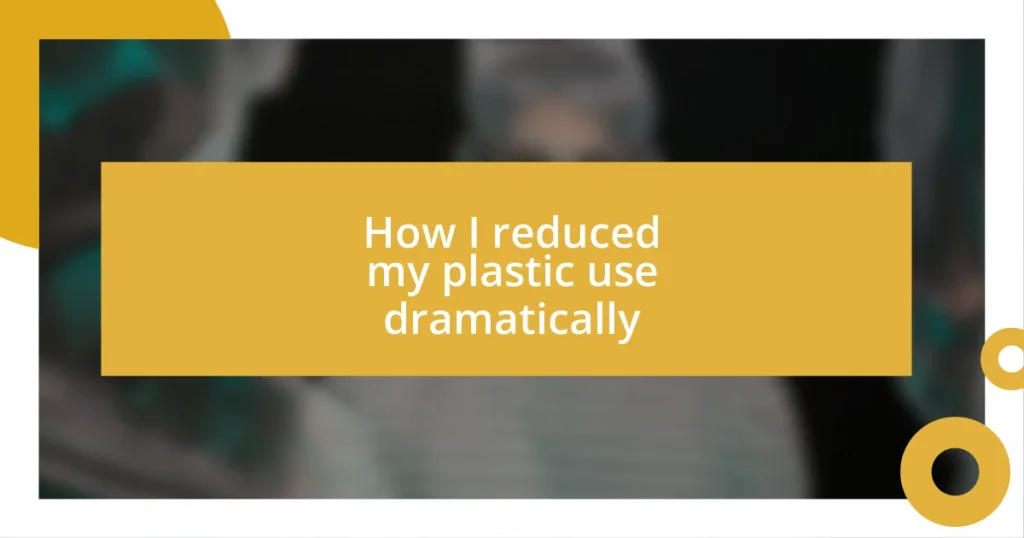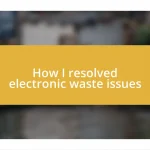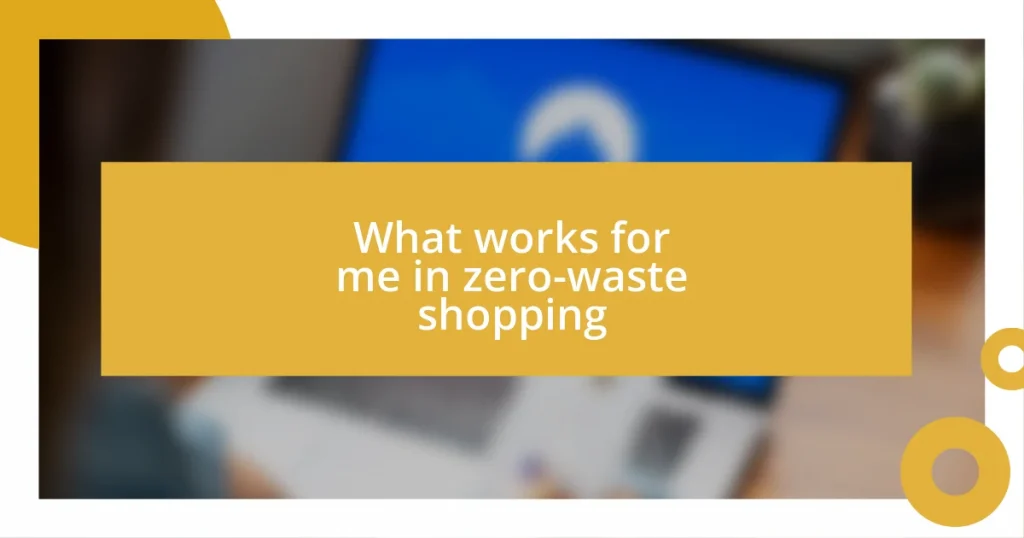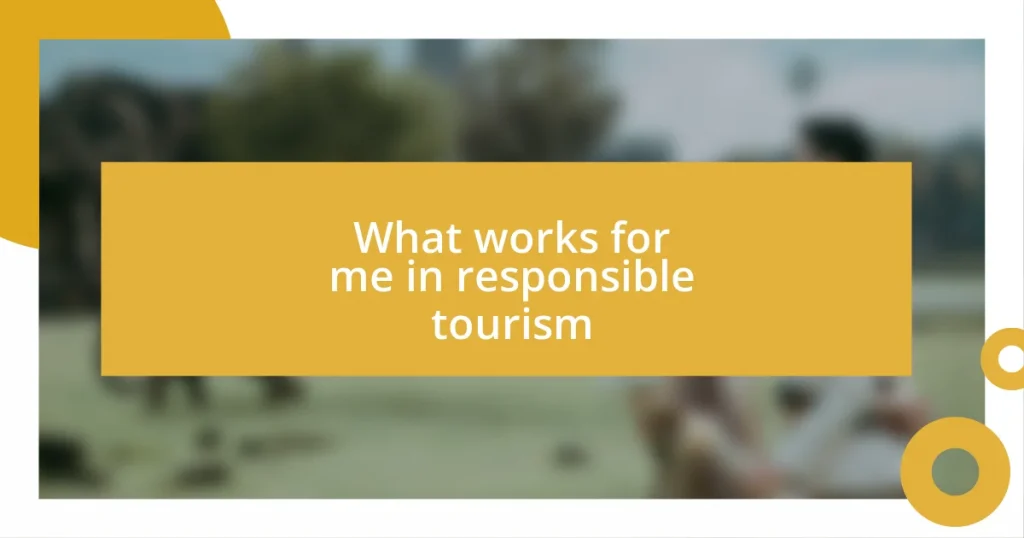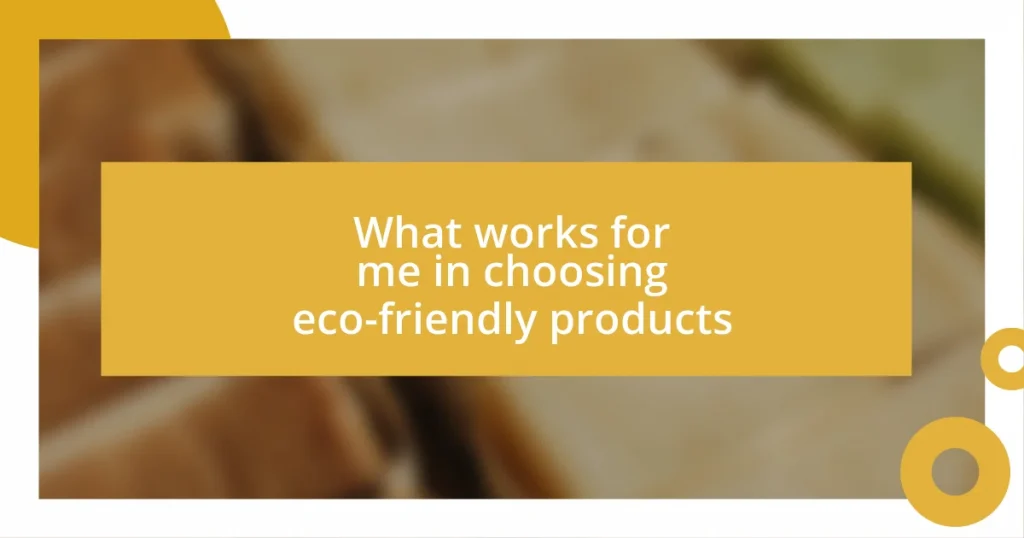Key takeaways:
- Plastic pollution has long-term environmental and health impacts, as plastic takes hundreds of years to decompose.
- Making small daily changes, like using reusable bags and embracing bulk shopping, can significantly reduce plastic consumption over time.
- Advocating for community actions and tracking progress helps inspire collective efforts and maintain motivation in the journey towards a sustainable lifestyle.
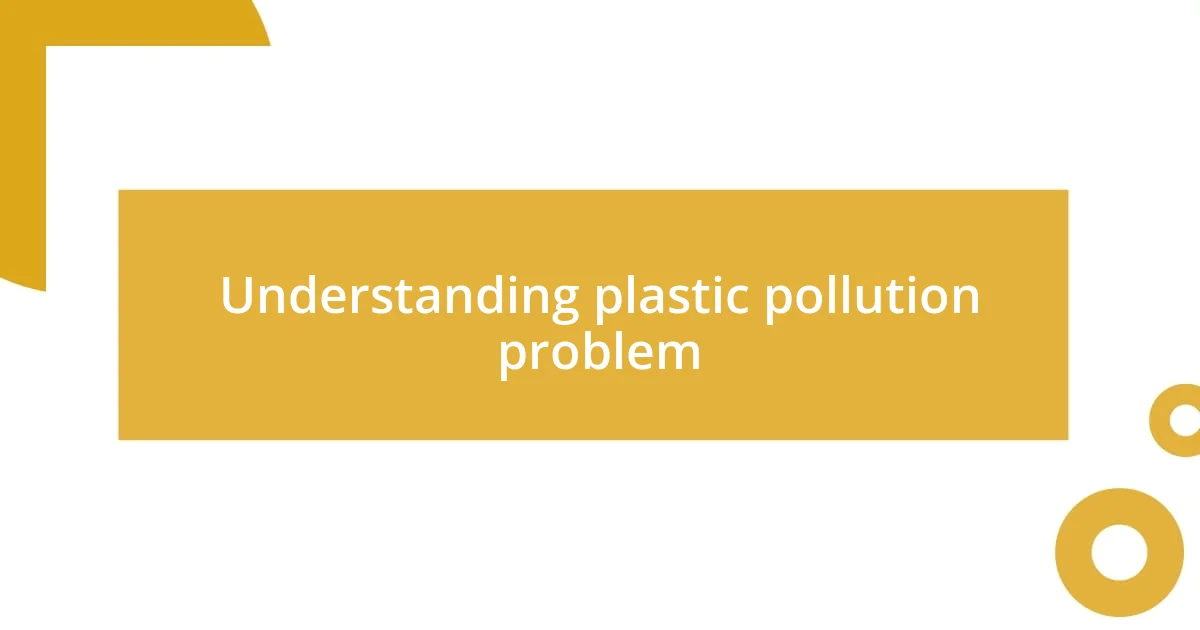
Understanding plastic pollution problem
Plastic pollution is an insidious problem that often feels overwhelming to grasp. I remember a moment that struck me profoundly: walking along my favorite beach, I was disheartened to see plastic debris scattered along the shoreline. How is it that something so convenient has become so harmful to our planet?
Many people don’t realize that plastic takes hundreds of years to decompose. Picture this: every single piece of plastic you’ve ever used is still somewhere on this earth. It’s enough to make anyone pause and think about the long-term effects of our consumption habits.
Moreover, the impact of plastic pollution extends beyond the environment; it affects wildlife and even human health. I often wonder about the fish I eat—are they ingesting microplastics? This realization adds a layer of urgency to the fight against plastic pollution, reminding us that our choices today directly shape the future.
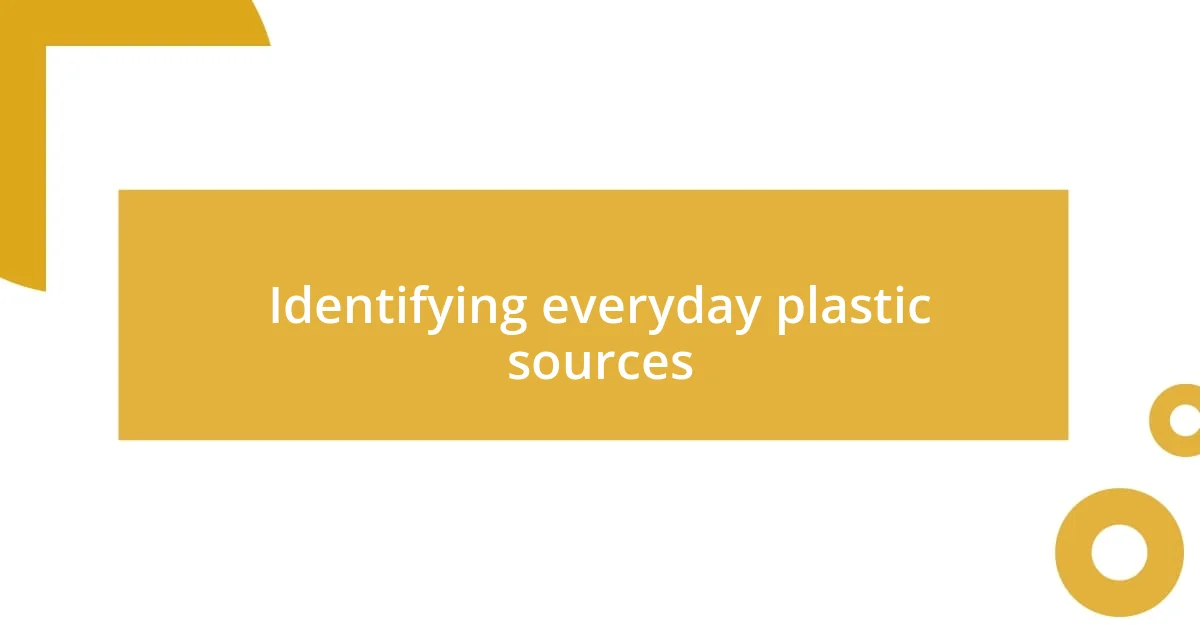
Identifying everyday plastic sources
When I began my journey to reduce plastic use, I quickly realized that understanding where plastic invades our daily lives was crucial. It’s surprisingly pervasive. From the moment I wake up to the time I go to bed, plastic seems to be everywhere.
Consider these common sources of plastic in everyday life:
- Toiletries: Bottles of shampoo, toothpaste tubes, and plastic razors.
- Food Packaging: Takeout containers, plastic wraps, and pre-packaged groceries.
- Household Items: Cleaning product bottles and plastic kitchenware.
- Clothing: Polyesters and synthetic blends commonly found in modern fabrics.
Each time I noticed another plastic item in my home, it felt like a small epiphany, prompting me to question whether I genuinely needed it or if there was a better alternative. This awareness was eye-opening and, at times, a bit overwhelming. I remember standing in my kitchen, surrounded by all the plastic containers I’ve accumulated over the years, and it hit me how these seemingly innocuous items contribute to the bigger issue of pollution.
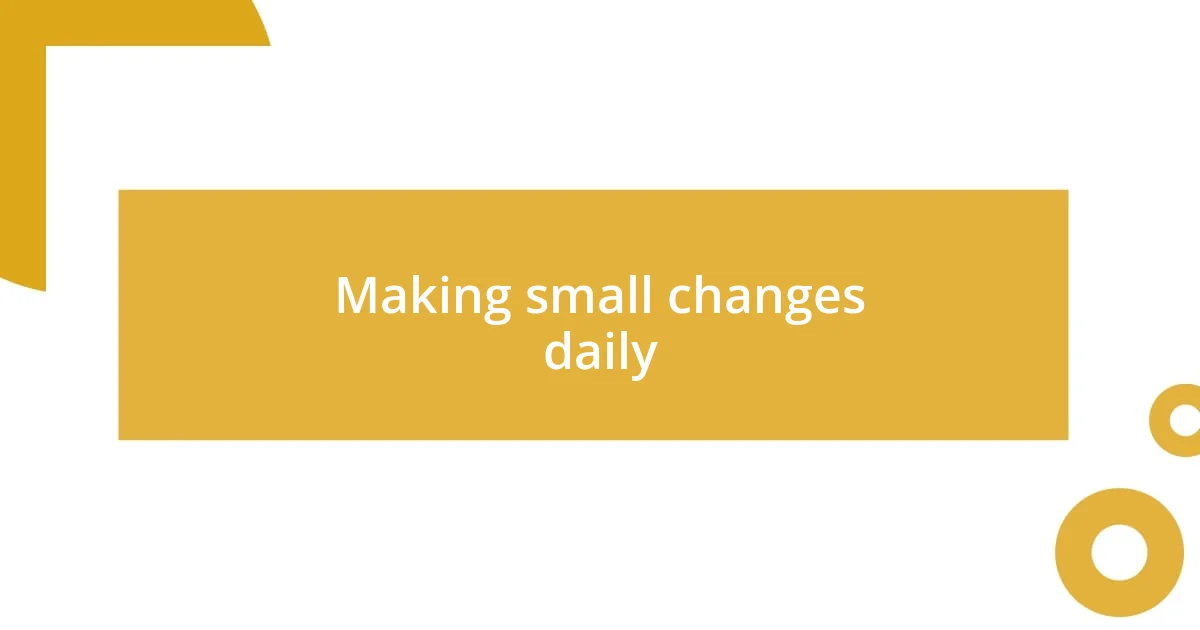
Making small changes daily
Making small changes daily can accumulate into a significant impact over time. I started with just one reusable shopping bag. At first, it felt like a hassle to remember to take it, but soon, it became second nature. I felt a rush of satisfaction each time I left the store without a single piece of plastic in my hands. It taught me the importance of small victories—each one builds momentum in a larger movement.
Transitioning to a plastic-free lifestyle doesn’t have to be daunting. For instance, when I switched to a bamboo toothbrush, I realized how simple it was to make environmentally friendly choices. At first, I was skeptical. Would switching toothbrushes really make a difference? But every time I pick it up, I feel a sense of pride, knowing I’ve opted for a sustainable alternative. This small change was not just about the toothbrush; it opened my eyes to countless other opportunities to reduce my plastic footprint.
Moreover, I began to embrace bulk shopping for grains and snacks, bringing my own containers. This habit has not only diminished the amount of plastic waste I generate but also gave me a chance to connect with local businesses. Every scoop of rice or nuts fills me with joy, knowing I’m playing a part in this crucial shift towards sustainability. It’s amazing how simple it can be when you start looking for those little changes in your day-to-day routine.
| Small Changes | Impact |
|---|---|
| Reusable Shopping Bags | Eliminates plastic bags used during shopping. |
| Bamboo Toothbrush | Reduces plastic waste from oral hygiene products. |
| Bulk Shopping | Minimizes packaging waste and supports local businesses. |
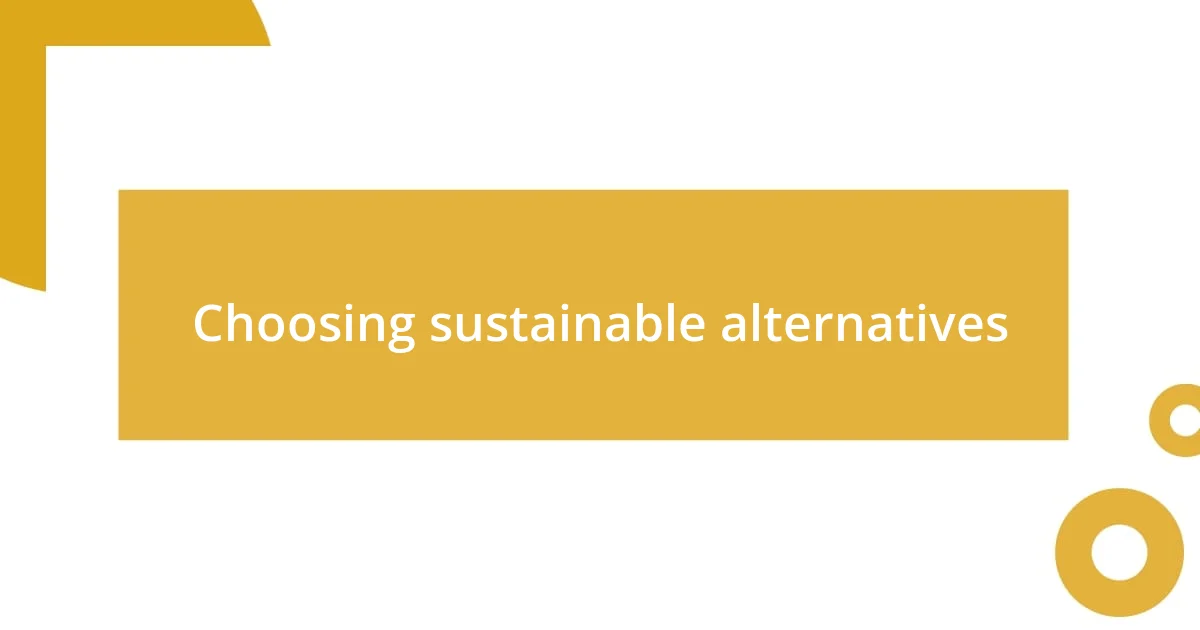
Choosing sustainable alternatives
Choosing sustainable alternatives has been one of the most rewarding parts of my plastic reduction journey. I vividly remember the moment I replaced my disposable plastic wrap with beeswax wraps. The first time I used them to cover leftovers, I felt a wave of satisfaction wash over me. “Why didn’t I do this sooner?” I thought. Those wraps not only kept my food fresh but also served as a beautiful reminder of my commitment to the environment every time I reached for them.
Switching to products made from natural materials has transformed my kitchen. I can’t forget the joy I felt when switching to stainless steel straws; the tactile difference was refreshing. I’d often wondered, “How many plastic straws have I mindlessly thrown away?” Now, every sip from a reusable straw feels like a small yet impactful choice. It’s crazy how an item so seemingly trivial can have such a significant environmental consequence.
Additionally, I started exploring local farmers’ markets, where I discovered fresh produce with minimal packaging. It’s incredible how an open-air market can shift the way I view food shopping. Each time I pick fresh vegetables, I can’t help but smile—this direct connection with the source of my food feels much more fulfilling than grabbing pre-packaged items at the grocery store. Plus, I always leave with reusable bags brimming with colorful, unpackaged produce, fueling my sense of purpose and commitment in this sustainable adventure.
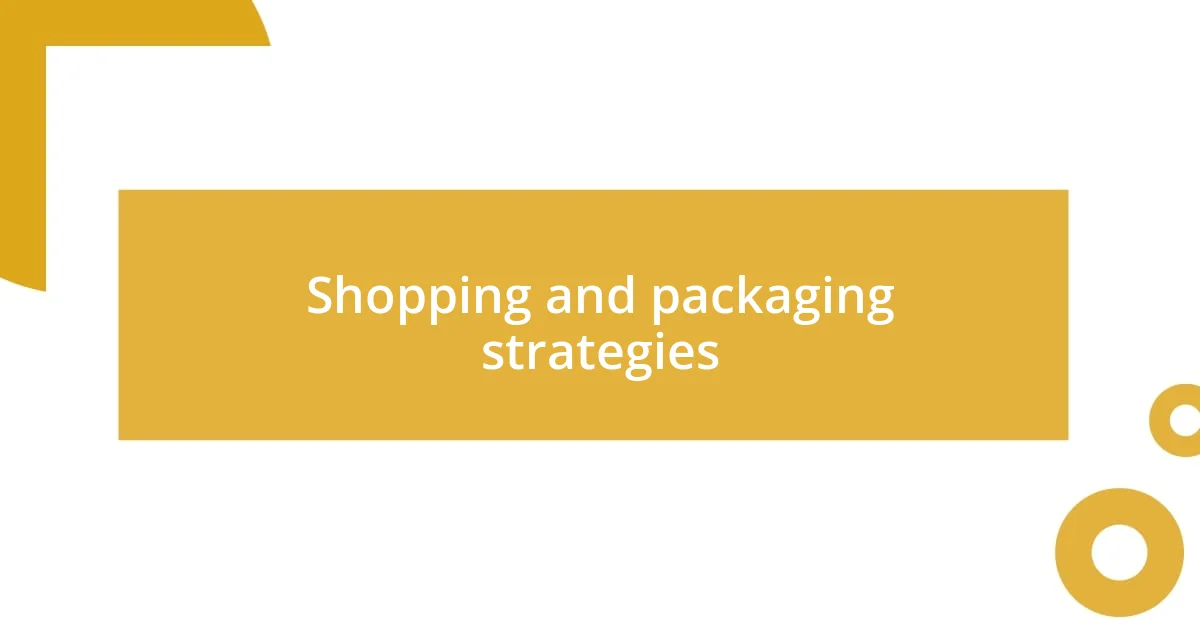
Shopping and packaging strategies
When I first decided to reduce my plastic use, I found myself standing in the aisles of the grocery store, overwhelmed by plastic-wrapped products. I realized I could avoid that feeling by planning my shopping trips smarter—creating a list focused on unpackaged or bulk items helped me stay on track. Now, I make it a point to explore the produce section first, filling my cart with fresh fruits and vegetables that don’t need any packaging at all. Isn’t it astonishing how something as simple as a banana or an apple doesn’t come with layers of plastic?
I also began to carry my own containers and reusable bags everywhere I went. The first time I pulled out my glass jars at a bulk store, I felt a mix of pride and nervousness. Would they laugh at me? Instead, the cashier congratulated me on my eco-friendly choice! This personal connection with the store made the experience far more enjoyable. It’s moments like these that remind me how small actions can spark a more significant change, fostering a sense of community with like-minded shoppers.
Switching to online shopping has also been a game-changer for me. I switched to brands that prioritize zero-waste shipping and sustainable packaging. The first time I unwrapped a package wrapped in compostable material, I couldn’t help but grin. “This is the future,” I thought, feeling hopeful about the possibilities. This experience reinforced my conviction that there are various ways to reduce plastic use, and each choice, no matter how small, plays a part in a larger movement toward sustainability. Aren’t we all looking for ways to contribute positively to the environment?
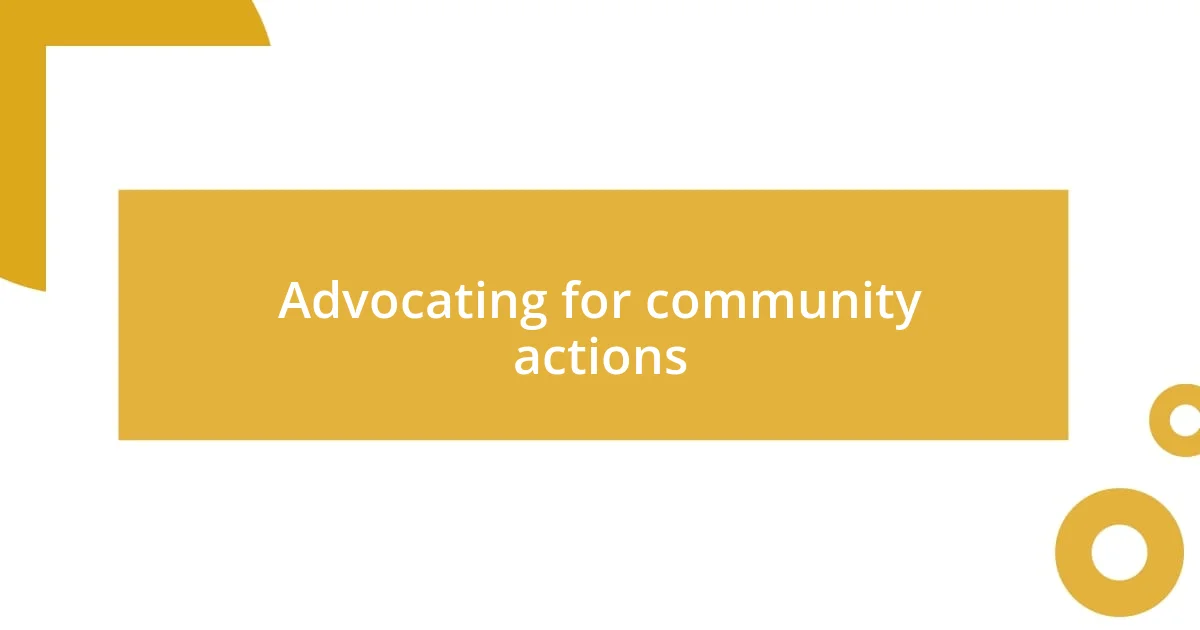
Advocating for community actions
Advocating for community actions has been a crucial step in my journey toward reducing plastic use. I remember when I organized a neighborhood clean-up event. The sense of camaraderie among us, working together to tidy our streets, sparked fascinating conversations about sustainable living. That day, I realized that collective efforts can inspire individuals to rethink their habits. Have you ever noticed how one person’s enthusiasm can ignite motivation in others?
Engaging with local organizations has been equally rewarding. I found a group focused on promoting plastic-free living, and attending their workshops opened my eyes to innovative alternatives. I still recall the first time I witnessed a demonstration on making homemade cleaning products—using just vinegar and baking soda! Experiencing those practical, hands-on solutions made the journey feel much more attainable. Isn’t it empowering to see that simple changes can lead to a ripple effect within the community?
One memorable initiative I took part in was a campaign to encourage local businesses to reduce plastic waste. I approached my favorite café, and to my delight, they agreed to offer discounts for customers who brought their reusable cups. The joy on my face when I saw fellow patrons participating was priceless. It made me appreciate how local actions can create a cascading impact. How great would it be if every small business embraced such eco-friendly practices? This experience affirmed that advocacy begins with each of us, and together, we can create meaningful change.
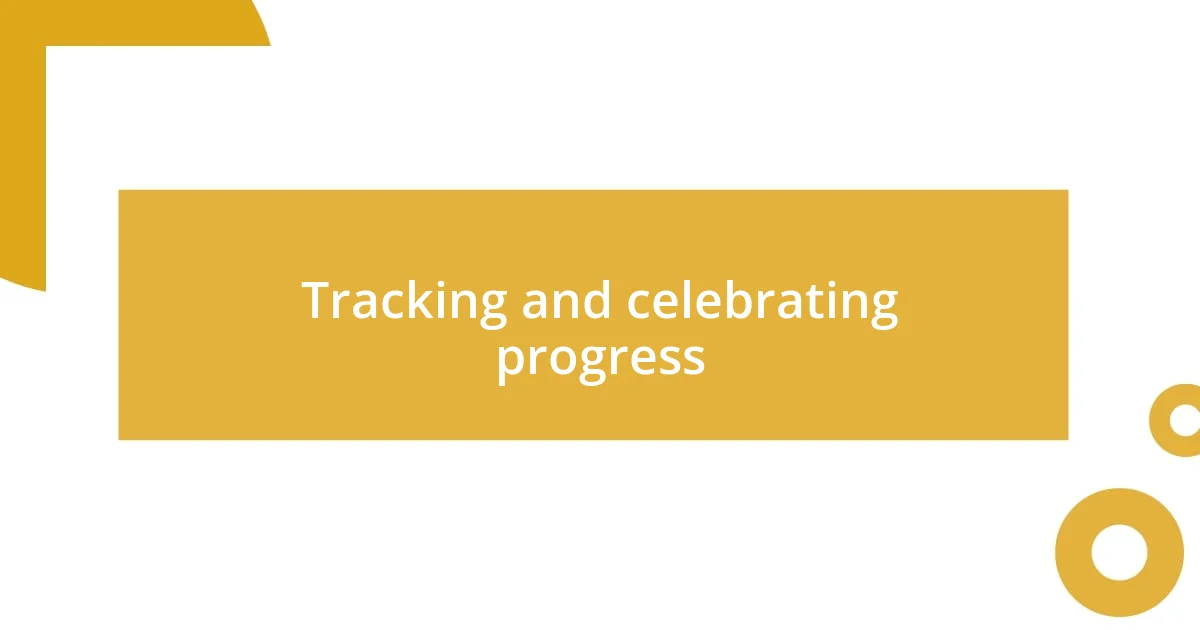
Tracking and celebrating progress
Tracking my progress has been one of the most rewarding aspects of my journey to reduce plastic use. I started by keeping a simple journal, noting each eco-friendly decision I made. What truly surprised me was how those little changes added up over time. There was something satisfying about flipping through those pages and seeing the tangible results of my efforts. Isn’t it amazing how tracking can turn abstract goals into actionable achievements?
I also embraced visual tools like charts and graphs to capture my progress. The first time I filled in a bar graph showing my decreasing plastic consumption, I felt a surge of motivation. Watching that line drop week after week became addictive. It was like a game, and I was determined to level up each time. Those visuals not only helped me stay accountable but also fueled my passion through the ups and downs of the process.
Celebrating milestones is just as vital as tracking progress. I can still recall the day I reached my goal of a plastic-free month— I treated myself to a little celebration, complete with a homemade feast featuring all my favorite ingredients. Sharing this achievement with friends made it even more special. Have you ever noticed how celebrating milestones can breathe new life into your commitment? I believe recognizing these moments fosters a sense of accomplishment, reinforcing the journey toward a more sustainable lifestyle one day at a time.
